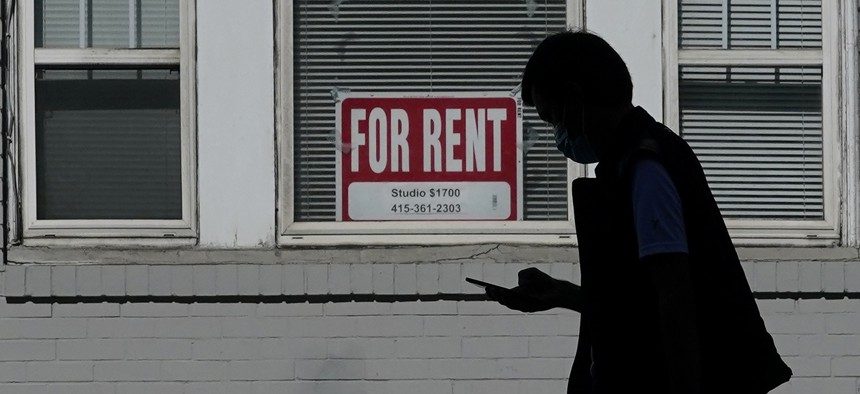22 States, Biden Administration Ask Supreme Court to Keep Eviction Ban in Place

In this Oct. 20, 2020 file photo, a man walks in front of a For Rent sign in a window of a residential property in San Francisco. AP Photo/Jeff Chiu
A legal challenge brought by landlords seeks to strike the national eviction moratorium, which is set to expire June 30 unless it is extended.
Attorneys general from 22 states and the District of Columbia asked the Supreme Court not to end the federal eviction moratorium, warning that its expiration would unleash an unprecedented and “catastrophic” wave of evictions. The Biden administration also has asked to keep the moratorium intact.
The eviction moratorium is set to expire June 30 unless the Biden administration extends it, but a group of landlords has challenged the legality of the ban and asked the high court to end it.
A lower court judge struck down the ban last month, ruling that the Centers for Disease Control and Prevention overstepped its authority in issuing the moratorium. But the ruling was put on hold as the case was appealed.
The attorneys general filed an amicus brief in the case Thursday, writing that states have relied on the federal moratorium as they crafted responses to the coronavirus pandemic. Forty-four states have implemented eviction protections during the pandemic, with some including tenant protections that go beyond the federal ban, the attorneys general wrote.
“While individual states have acted differently, the stable landscape of a nationwide eviction moratorium has been critical to each states’ public health response,” attorneys wrote in the filing. “The sudden dissolution of the CDC’s moratorium would throw states’ carefully crafted responses into disarray.”
The attorneys general represent Connecticut, California, Colorado, Delaware, Hawaii, Illinois, Maine, Maryland, Massachusetts, Michigan, Minnesota, Nevada, New Jersey, New Mexico, New York, North Carolina, Oregon, Pennsylvania, Rhode Island, Virginia, Washington Wisconsin and Washington, D.C.Attorneys for the U.S. Department of Health and Human Services wrote in court filings made Thursday that no decision has been made about whether to extend the federal moratorium. They also asked the court to keep the moratorium intact.
But national housing experts who have been in contact with administration officials about the issue said they do not expect it to be extended beyond June 30.
Landlords and property owners say the moratorium has shifted the pandemic’s financial burdens off of renters and onto them. Each month the moratorium is in place costs landlords, most of which “are individuals and small businesses,” more than $13 billion in unpaid rent, they said in a court filing.
Local emergency rental assistance programs are expected to provide aid for many renters, but some programs have been slow to ramp up—leaving housing advocates concerned that money won’t make it to renters before the eviction moratorium expires.
Many housing and legal aid advocates are simultaneously working to publicize the programs and help eligible renters apply and also calling for state and local governments to extend their eviction moratoriums to provide an additional layer of protection.
Some lawmakers have heeded the call. The Seattle City Council this week approved a package of three bills that would make it harder for landlords to evict tenants—one of the bills would ban evictions for non-payment of rent during the public health emergency.
Cities and states have also sought to provide legal aid for renters facing eviction, enacting right to counsel laws that require legal representation for low-income renters in eviction cases.
Andrea Noble is a staff correspondent with Route Fifty.
NEXT STORY: Supreme Court Weighs Voting Rights in a Pivotal Arizona Case





